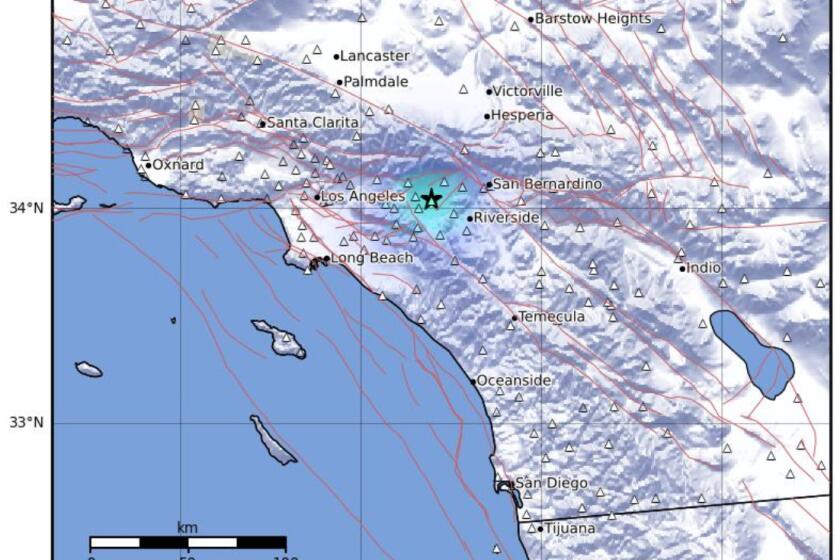Achilles’ Heel of the DWP Deregulation Plan: Union Clout
The City Council needs to take a more critical look at a plan to make the Department of Water and Power competitive in the world of utility deregulation. Unfortunately, the council’s recent lack of scrutiny already has proved costly and may even deny ratepayers the full savings promised by deregulation.
To help pay down the DWP’s large debt, General Manager S. David Freeman wants to cut 2,000 jobs from its payroll. He’s targeted excess jobs in management, engineering and support staff to force workers to take early retirement or severance packages. But he is sparing the politically powerful International Brotherhood of Electrical Workers, which represents 70% of the DWP’s employees. Although none have been targeted for layoffs, Freeman is offering all union members rich inducements to participate in an unfocused and expensive voluntary-separation program.
The council approved Freeman’s basic agreement with the union in mid-December. IBEW members can choose early-retirement incentives or voluntarily resign and take $25,000 to $50,000 Michael T. Moore, former executive director of Public and Employee Communications at the DWP, is vice president of Water and Power Associates, an education and public-service organization.
severance packages. Also included was a contract extension through 2002, locking in five years of annual pay hikes of 4%, at a time when inflation is running at 2% a year. The price tag for rate payers: $350 million.
Freeman deserves credit for quickly assembling his plan. But he apparently succumbed to the prospect of an easy sale to the City Council by swallowing the IBEW’s agenda. Along the way, Freeman committed a major strategic error by setting up DWP customers as hostages for union blackmail.
IBEW’s ability to avoid deep cuts is not because its members are paragons of efficiency. Quite the contrary. For several years, the DWP has participated in an annual survey of the power-distribution units of electric utilities, known as the PACE Group. The union represents most distribution workers. The latest survey revealed that DWP’s overhead and underground construction and maintenance costs were among the highest in the PACE Group. More troubling was that these higher costs did not translate into higher levels of service, and the volume of outages was growing.
The PACE survey listed several reasons for the department’s high costs. For example, while the majority of participating utilities have moved to more flexible one- and two-person crews, DWP still uses three to five workers. Also, other utilities contract out approximately 25% of their new construction work, the DWP hardly any.
The efficiency problem is not new, which is why it’s worrisome that Freeman ignored it. More than three years ago, the Barrington-Wellesley Group, at council request, audited the DWP. They concluded that the utility’s Power Distribution unit was 20% overstaffed. They noted that crew sizes were too large and should be reduced, as had been recommended in the DWP’s decennial survey in 1990. The audit also recommended that the DWP eliminate non-working supervisors on large crews, which most utilities have done.
Freeman seems willing to accept continuing high distribution costs. That’s politically expedient because California’s deregulation program only applies to the generation side of the business, not distribution, which remains a protected monopoly. But from a customer standpoint, it means that excessive distribution billings will offset anticipated savings in the generation portion of bills.
IBEW’s success is a measure of its inordinate bargaining clout with the city. At Southern California Edison and Pacific Gas & Electric, IBEW can only organize workers below first-level supervisor, because the National Labor Relations Act excludes supervisors and above from unionization. At DWP, however, the union can organize far above first-level supervisor, owing to state and local laws. Accordingly, the IBEW can take out a far greater percentage of the DWP work force than its brother locals at the utility’s competitors.
During the ’93 strike, the city was lucky that a handful of management personnel, with previous experience in the electrical crafts, was able to hold the electric system together for the duration of the strike. Ironically, Freeman’s plan would eliminate all these positions.
In past strikes at DWP, the IBEW’s strategy has been to let the distribution system deteriorate, not repairing normal outages as they occurred. The union knew outraged customers would force elected officials to yield to its demands. Under the Freeman plan, the IBEW will take complete control of the distribution system and local generation as well.
Armed with this kind of power, the union has little incentive to adopt initiatives improving productivity. This sharply contrasts with the progressive stance of many other IBEW locals at investor-owned utilities, at which the union is working closely with management to improve performance.
The best short-term answer to this problem is for the council to withhold approval of the proposed new contract with the IBEW until the union adds solid agreements on productivity improvements and limits on organizing supervisors. If the union balks at changing its representation of supervisors, the council should reject Freeman’s plan to lay off high-level supervisory craft personnel. Otherwise, the council is being asked to give up the store for only a few years of labor peace and token cooperation. Without these actions, the DWP will be woefully unprepared for the rigors of the competitive market place--and customers will pay the price.*
More to Read
Sign up for Essential California
The most important California stories and recommendations in your inbox every morning.
You may occasionally receive promotional content from the Los Angeles Times.










